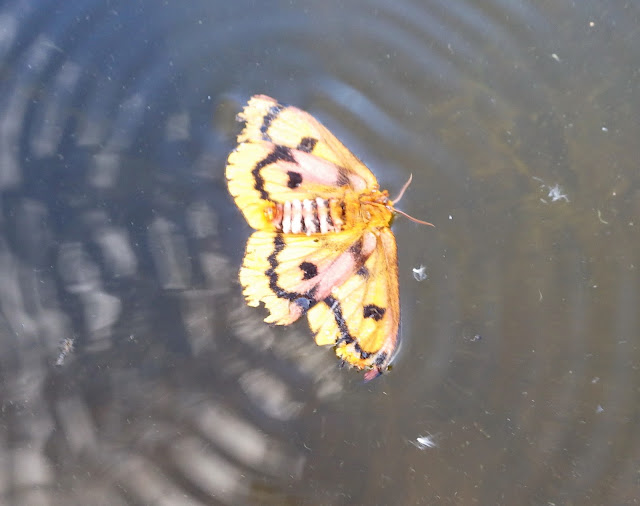It's hot. A doe comes out in the heat of the day and browses in the shade of the trees at the edge of the yard, then ghosts through the sun back into the trees by the river.
It's a good evening for fishing. Out of curiosity you drive past Trout Lake to Brookie Lake. As you suspected, the weeds have taken over. The brookies will need to wait until later.
Back at Trout Lake you launch at the far north end. This is the way you like it: hot and still.
You begin with a Damselator.
As you work up the shoreline clouds begin to pile up in the west.
You turn the corner and drift along the reeds. A spot of magenta comes out of the sun and plunges into the lake, rises up again like a spark, and spins back onto the water.
It's a Western Sheep Moth, named from its tendency to be observed in pastures with sheep. It's common from the Rocky Mountains on west, and is day flying.
This one is a bit tattered--and wet--but after a few moments on your finger it lifts off and flutters high in the air and disappears over the shoreline trees.
You head on. It looks like the storm will pass by to the north.
You're getting some action with the damsel imitation. They're little but scrappy. One fish wraps around a clump of reeds too deep to reach. As you try to extricate it by pulling on the line the tippet snaps off. You have another Damselator and tie it on.
It's another evening to keep looking up and around at the ever-changing light show.
You work over the inlet. More scrappy little fish.
On down you lose a better fish, then snag the fly trying to go back for it. You kick in to retrieve it and peer across the driftwood fence at the burbling waters of the hidden haven of ducks and beaver.
You round a little point and begin working a half moon bay. It has been known to hold good fish.
You cast the Damselator in to the willows, let it sit, then strip it back ten feet or so. You raise the rod to lift the fly off the water for another cast just as a fish grabs it. Perfect timing.
It's a good fish, and it's a Brown. You get it into the net. You see that you just barely hooked it. The fish rolls in the net and the fly comes out. You try to situate the fish for a quick photo and it launches itself right out of the net and into the water. Bye bye, Brown.
Well, we'll always have Paris.
You switch to a newly tied muddler, olive version.
You kick back to the reeds for another pass over the shoreline you just covered.
You get a nice bump as you drift the fly behind you, but the fish won't commit.
Back at the inlet you manage to net a bigger Rainbow, and get photos of it.
The storm is far away now.
You try for that Brown again, but he's gone or not playing anymore. You kick around and enter the haven of ducks and beaver because it's also a good place to take a pee break.
There's the beaver house. It's as tall as you are. No wonder there are so many beaver around here.
You kick back out and head across the lake to the other side.
You drift the muddler behind you but there are no takers. The clouds drift away with the sun.
You work the shoreline. As always, you sort through the memories that each section of shoreline evokes. Long ago, when the boys were little, the three of you fished from the bank here.
This stretch is slow again this evening. It should pick up later in the summer. Right now, though, the only thing moving is a skunk.
Then, at dusk, trying to keep the bats from picking up the fly, you hook into another nice Brown. You know it's a Brown because you get it in close. But before you can reach for the net it comes off the hook.
A few moments later you catch a consolation prize. You would have preferred the Brown.
It's deep twilight now, and Jupiter is shining high in the southern sky. It's warm and still. You get to the takeout but kick on past it. You want it all to last just a little longer.



































































